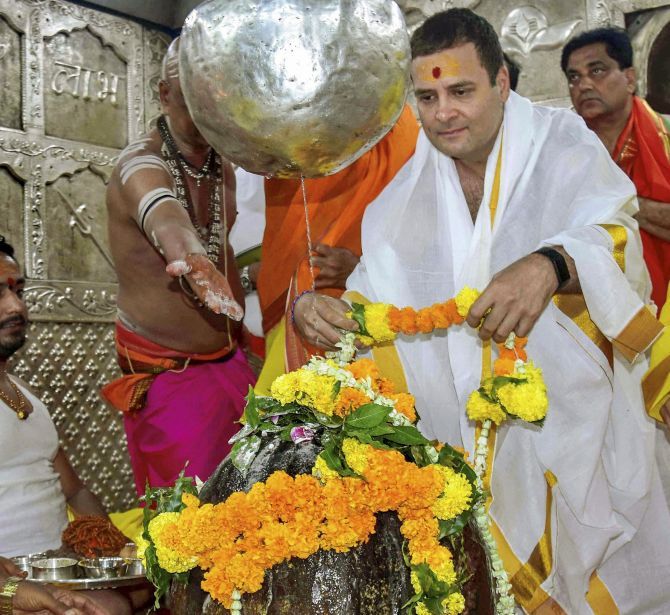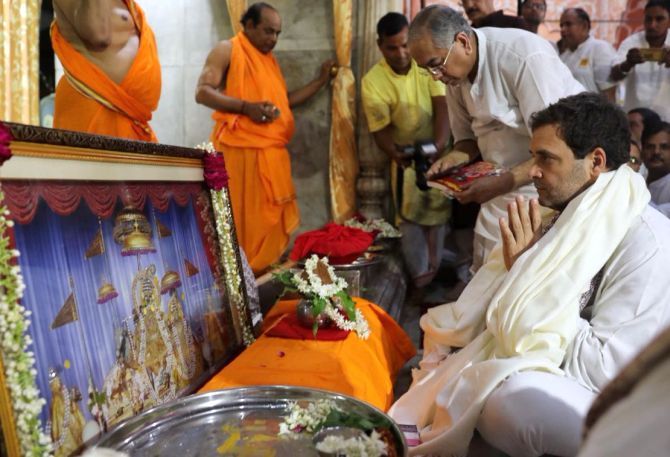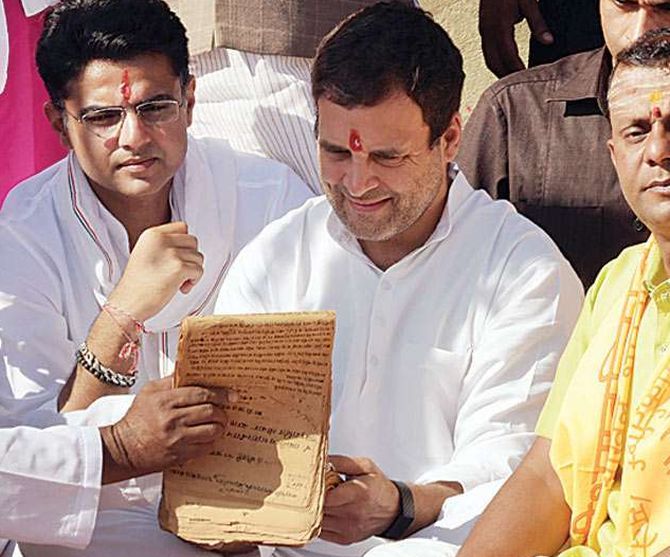'If Rahul wants to pick up the sacred thread, when the BJP, which reduced his party to 44 in 2014, claims monopoly over Hinduism, it's smart politics.'
'Why cede your Gods to your rival?' asks Shekhar Gupta.

Rahul Gandhi's self-discovery as a practising Hindu and an 'uchch koti' (upper tier) Brahmin has confounded his ideological adversaries and outraged his likely friends. He's got tough love from both. We are arguing here that he has made a most audacious and smart political move at this juncture.
The BJP was so irritated that it first wanted to know his gotra as evidence of his claim to being a janeu-dhari (sacred thread-wearing) Brahmin. It unsettled them even more when the gotra was disclosed.
They fielded their science and technology minister to raise profound 'technical' points on how Brahmin gotra travels down the generations.
See what political chutzpah by the top leader of the Congress, India's largest claimant of the secular space, has achieved.
Until not long ago, the debate was on whether Rahul is a Hindu at all or a closet Christian. Then, it moved to whether he is a Brahmin. Now it is about whether he can claim to be a Kashmiri Kaul Brahmin from the Dattatreya gotra.
Since religion, caste and gotra has now been made so central to national politics, this is progress.
A move up the value chain. Definitely for Rahul and his party.
We don't know yet if Rahul did this to a plan or is it just that he went to a couple of temples during the Gujarat elections and then the law of unintended consequences took over.
If you are a Rahul/Congress supporter, you can use that expression 'political masterstroke' usually copyrighted by Modi-Shah supporters.
If you are from the BJP, you might say he's recklessly walking into an unprotected political place. He will not get the Hindu vote and lose the secular vote, particularly the Muslim.
As they'd put it in heartland Hindi: Duvidha mein dono gaye, maya milee na Ram (I lost both in my confusion: Worldly pleasures and God).
I'd prefer a different description. But a little later.

Rahul has the Left-secular-liberal commentariat in a tizzy. They see it as a betrayal of everything the Congress stood for, a fundamental rewriting of its ideology and a final goodbye to India's syncretic tradition.
The latest, and a particularly well-argued piece by Suhas Palshikar in The Indian Express asks if he really wanted to show he's a believer, couldn't he visit places of worship of all religions, as his grandmother Indira might have done.
Endorsing this, Nehru and Mahatma Gandhi's biographer Ramachandra Guha wrote: 'Rahul Gandhi's amoral temple-hopping is an absolute betrayal of the best traditions of the party he claims to represent. Both Gandhi and Nehru would have been appalled by this shameless pandering to majoritarianism.'
Writing in ThePrint, progressive editor and intellectual Dilip Mandal lists 30 privileges that he says Brahmins get by entitlement and tempted Rahul. The criticism gets shriller as you move sharper to the Left.
Let me pick an argument with all of these.
The central charge against Rahul is hypocrisy. Now when was hypocrisy a liability in politics? It is, on the other hand, an essential tool. Show me one politician who isn't a hypocrite and I will show you a loser.
Early on in my years of learning about Indian politics, I had once asked then Haryana chief minister Om Parkash Chautala if his and his family's lifestyle, while claiming to speak for the poor farmer, wasn't hypocrisy. He said, "Bhai sahib, hum rajneeti karne aaye hain, ya teerthyatra pe? (Are we doing politics, or a pilgrimage?)"
This is a deeply religious country. In all large polls, including Pew and Gallup, more than 99 per cent Indians say they are believers, leaving atheists a fraction even of our NOTA voters.
There is no vote against the Gods here. Nehru got away with his agnosticism because it was still the afterglow of the freedom movement and he was, after all, Nehru. His daughter was quick to rectify this, never shy of mandirs, sadhus, poojas and her rudraksh string.

If Rahul wants to pick up the sacred thread where his 'daadi' left it, especially when the BJP, which reduced his party to 44 in 2014, claims monopoly over Hinduism, it's smart politics. Why cede your Gods to your rival?
You can call it amoral, and you are welcome to find a truly moral politician, a maryada purushottam. I'm yet to meet one.
Compromises would follow. Rahul's Congress is guarded on triple ,em>talaq, blank on the Ram temple, one with the RSS on Sabarimala. Check its cow and cow urine-laden manifesto in Madhya Pradesh.
Liberal disappointment with Rahul is understandable. But he cannot survive in politics with Nehruvian hard secularism.
It won't win him elections anywhere, not even in JNU, and he would end up the most illustrious loser in modern India's history.
Further, if he were to return fully to his grandmother's way, he would look to deny the BJP monopoly over both, faith and nationalism.

We live in an India very different from what Nehru left behind.
Jurist Fali Nariman made this point brilliantly in his Constitution Day speech. Quoting scholar Granville Austin, he said, 'Austin saw in our Constitution three strands -- protecting and enhancing national unity and integrity; establishing institutions of democracy, fostering social reforms. Taken together, they form a seamless web. But yet lurking in the distance, there is an omnipresent fourth strand, culture.'
That culture, which includes religion and tradition, is where the Congress and the UPA, under Sonia Gandhi and her mostly Leftist National Advisory Council, lost their way. They began looking alien.
India was no longer willing to accept that degree of clinical, near-agnostic secularism. One of the lines spoken in those years by Manmohan Singh -- minorities have the first right on their country's resources -- continues to haunt the Congress even now.
The UPA vacated the Hindu-nationalist space fully for Narendra Damodardas Modi's BJP.
Rahul's shift probably fails the test of philosophical perfection, but it's interesting politics, displaying an unfamiliar risk-taking ability. He has deliberately stepped on an unfamiliar pitch. There are many in the BJP/RSS who think they've got him just where they wanted.
We had said earlier we would prefer another description for Rahul's move. So here it is. This is like walking into a political chakravyuha. He can now win or perish. He cannot retreat.
And if he plays the 'a-bit-of-this-and-a-bit-of-that' game, he knows where that landed his father by 1989.
By special arrangement with ThePrint











